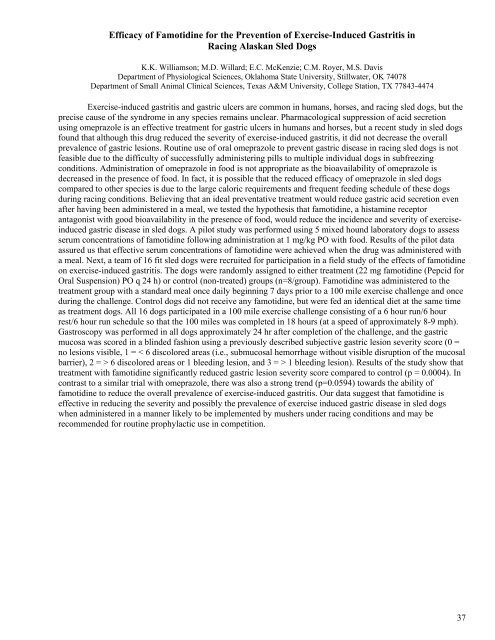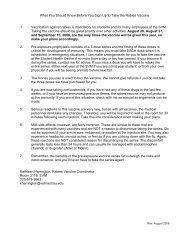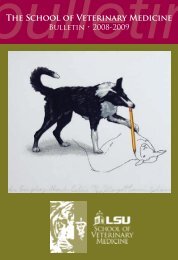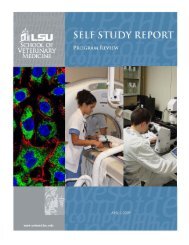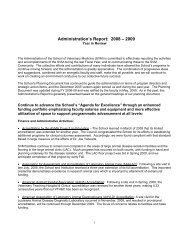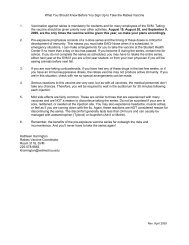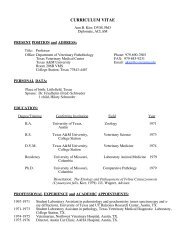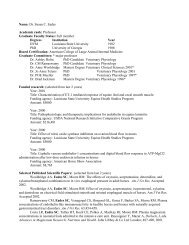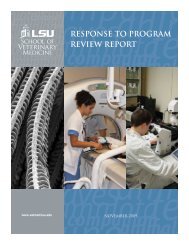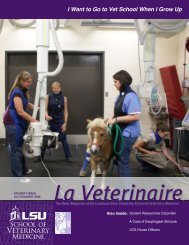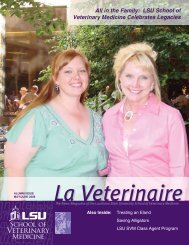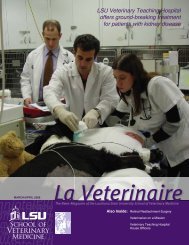2006 merck/merial - School of Veterinary Medicine - Louisiana State ...
2006 merck/merial - School of Veterinary Medicine - Louisiana State ...
2006 merck/merial - School of Veterinary Medicine - Louisiana State ...
Create successful ePaper yourself
Turn your PDF publications into a flip-book with our unique Google optimized e-Paper software.
Efficacy <strong>of</strong> Famotidine for the Prevention <strong>of</strong> Exercise-Induced Gastritis inRacing Alaskan Sled DogsK.K. Williamson; M.D. Willard; E.C. McKenzie; C.M. Royer, M.S. DavisDepartment <strong>of</strong> Physiological Sciences, Oklahoma <strong>State</strong> University, Stillwater, OK 74078Department <strong>of</strong> Small Animal Clinical Sciences, Texas A&M University, College Station, TX 77843-4474Exercise-induced gastritis and gastric ulcers are common in humans, horses, and racing sled dogs, but theprecise cause <strong>of</strong> the syndrome in any species remains unclear. Pharmacological suppression <strong>of</strong> acid secretionusing omeprazole is an effective treatment for gastric ulcers in humans and horses, but a recent study in sled dogsfound that although this drug reduced the severity <strong>of</strong> exercise-induced gastritis, it did not decrease the overallprevalence <strong>of</strong> gastric lesions. Routine use <strong>of</strong> oral omeprazole to prevent gastric disease in racing sled dogs is notfeasible due to the difficulty <strong>of</strong> successfully administering pills to multiple individual dogs in subfreezingconditions. Administration <strong>of</strong> omeprazole in food is not appropriate as the bioavailability <strong>of</strong> omeprazole isdecreased in the presence <strong>of</strong> food. In fact, it is possible that the reduced efficacy <strong>of</strong> omeprazole in sled dogscompared to other species is due to the large caloric requirements and frequent feeding schedule <strong>of</strong> these dogsduring racing conditions. Believing that an ideal preventative treatment would reduce gastric acid secretion evenafter having been administered in a meal, we tested the hypothesis that famotidine, a histamine receptorantagonist with good bioavailability in the presence <strong>of</strong> food, would reduce the incidence and severity <strong>of</strong> exerciseinducedgastric disease in sled dogs. A pilot study was performed using 5 mixed hound laboratory dogs to assessserum concentrations <strong>of</strong> famotidine following administration at 1 mg/kg PO with food. Results <strong>of</strong> the pilot dataassured us that effective serum concentrations <strong>of</strong> famotidine were achieved when the drug was administered witha meal. Next, a team <strong>of</strong> 16 fit sled dogs were recruited for participation in a field study <strong>of</strong> the effects <strong>of</strong> famotidineon exercise-induced gastritis. The dogs were randomly assigned to either treatment (22 mg famotidine (Pepcid forOral Suspension) PO q 24 h) or control (non-treated) groups (n=8/group). Famotidine was administered to thetreatment group with a standard meal once daily beginning 7 days prior to a 100 mile exercise challenge and onceduring the challenge. Control dogs did not receive any famotidine, but were fed an identical diet at the same timeas treatment dogs. All 16 dogs participated in a 100 mile exercise challenge consisting <strong>of</strong> a 6 hour run/6 hourrest/6 hour run schedule so that the 100 miles was completed in 18 hours (at a speed <strong>of</strong> approximately 8-9 mph).Gastroscopy was performed in all dogs approximately 24 hr after completion <strong>of</strong> the challenge, and the gastricmucosa was scored in a blinded fashion using a previously described subjective gastric lesion severity score (0 =no lesions visible, 1 = < 6 discolored areas (i.e., submucosal hemorrhage without visible disruption <strong>of</strong> the mucosalbarrier), 2 = > 6 discolored areas or 1 bleeding lesion, and 3 = > 1 bleeding lesion). Results <strong>of</strong> the study show thattreatment with famotidine significantly reduced gastric lesion severity score compared to control (p = 0.0004). Incontrast to a similar trial with omeprazole, there was also a strong trend (p=0.0594) towards the ability <strong>of</strong>famotidine to reduce the overall prevalence <strong>of</strong> exercise-induced gastritis. Our data suggest that famotidine iseffective in reducing the severity and possibly the prevalence <strong>of</strong> exercise induced gastric disease in sled dogswhen administered in a manner likely to be implemented by mushers under racing conditions and may berecommended for routine prophylactic use in competition.37


